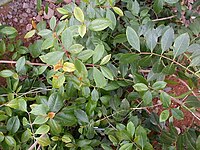
Photo from wikipedia
Objectives The purpose of this study was to assess the effects of habitual chewing of khat (Catha edulis) on blood pressure, body mass index, and physiological aspects of sexuality among… Click to show full abstract
Objectives The purpose of this study was to assess the effects of habitual chewing of khat (Catha edulis) on blood pressure, body mass index, and physiological aspects of sexuality among residents of an Ethiopian town. Methods A statistically determined and randomly selected sample of khat-chewing individuals in the town of Hosanna in Southern Ethiopia were included in the study. We used physical measurements and a self-administered questionnaire to collect the data, which was statistically analyzed. Results The participants comprised a total of 420 with mean age = 28.7±5.7 years; 336 (80.0%) were male. Nearly half (201; 47.9%) were in the age-group 30–34 years. The adverse effects of khat use were assessed from the median score of each outcome, namely, physical problems, abuse potential, and social effects. Having a score above the median on each of the three target outcomes was equated with the presence of adverse effects. Adverse effects were reported among 341 of 420 (81.2%) participants, of whom 277 of 341 (81.2%) were male and 64 of 341 (18.8%) were female. The reported adverse effects were significantly higher among those who co-used tobacco, coffee, or tea with khat, with adjusted odds ratio = 4.8; CI: 2.86–8.22. Conclusions Khat chewing was found to have a significant adverse effect on the health of individuals who indulged in it. This finding implies the need for urgent intervention from health authorities.
Journal Title: Oman Medical Journal
Year Published: 2023
Link to full text (if available)
Share on Social Media: Sign Up to like & get
recommendations!